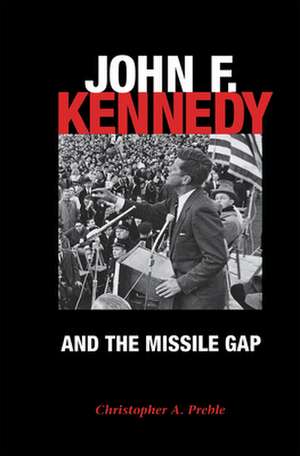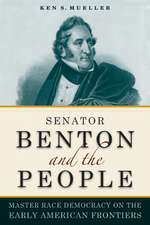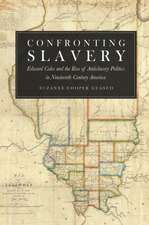John F. Kennedy and the Missile Gap
Autor Christopher A. Prebleen Limba Engleză Hardback – 18 noi 2004
John F. Kennedy owed his victorious bid for the presidency—as well as his success in reversing former president Dwight D. Eisenhower's military and economic policies while in office—largely to his ability to exploit fears of an alleged Soviet strategic superiority, famously known as the "missile gap." Capitalizing on American alarms about national security, within months after his inauguration, he won Congressional authorization for two supplemental defense appropriations that collectively increased the defense budget by more than 15 percent. Yet, argues Christopher Preble, the missile gap was a myth. The Kennedy administration perpetuated that myth to justify a massive military buildup that had profound implications for both the domestic economy and for American foreign relations.
Eisenhower had warned against excessive military spending, but the missile gap scare shook the confidence of millions of Americans. In the face of presumed Soviet dominance, Eisenhower's New Look programs no longer appeared adequate. By electing Kennedy, U.S. citizens signaled their willingness to bear any burden in exchange for peace of mind. Little did they realize that Kennedy's new military strategy, known as Flexible Response, marked a commitment to a war economy that persisted through the final days of the Cold War.
The myth of the missile gap and the policies that followed had a profound impact on U.S. Soviet relations. But by inducing doubts about America's capacity for world leadership, it also weakened the resolve of the nation's allies. On the home front and in the international arena, the missile gap shaped the outcome of the Cold War.
Eisenhower had warned against excessive military spending, but the missile gap scare shook the confidence of millions of Americans. In the face of presumed Soviet dominance, Eisenhower's New Look programs no longer appeared adequate. By electing Kennedy, U.S. citizens signaled their willingness to bear any burden in exchange for peace of mind. Little did they realize that Kennedy's new military strategy, known as Flexible Response, marked a commitment to a war economy that persisted through the final days of the Cold War.
The myth of the missile gap and the policies that followed had a profound impact on U.S. Soviet relations. But by inducing doubts about America's capacity for world leadership, it also weakened the resolve of the nation's allies. On the home front and in the international arena, the missile gap shaped the outcome of the Cold War.
Preț: 338.13 lei
Nou
Puncte Express: 507
Preț estimativ în valută:
64.74€ • 66.79$ • 53.66£
64.74€ • 66.79$ • 53.66£
Carte tipărită la comandă
Livrare economică 21 februarie-07 martie
Preluare comenzi: 021 569.72.76
Specificații
ISBN-13: 9780875803326
ISBN-10: 0875803326
Pagini: 256
Dimensiuni: 140 x 216 x 23 mm
Greutate: 0.44 kg
Ediția:1
Editura: Northern Illinois University Press
Colecția Northern Illinois University Press
ISBN-10: 0875803326
Pagini: 256
Dimensiuni: 140 x 216 x 23 mm
Greutate: 0.44 kg
Ediția:1
Editura: Northern Illinois University Press
Colecția Northern Illinois University Press
Recenzii
"Preble's contribution is significant.... [He] substantiates his thesis in great detail and draws upon excellent research."—The Journal of American History
"A path-breaking study ... raises key issues with respect to both cold war historiography and present-day international politics."—The International History Review
"An extremely thorough, well-documented effort."—American Historical Review
"A path-breaking study ... raises key issues with respect to both cold war historiography and present-day international politics."—The International History Review
"An extremely thorough, well-documented effort."—American Historical Review
Notă biografică
Christopher A. Preble is Director of Foreign Policy Studies at the Cato Institute. He holds a Ph.D. in History from Temple University.
Cuprins
Table of Contents
Preface
Introduction
1. Eisenhower, the New Look, and Their Critics
2. A Senator Finds His Voice
3. The Presidential Election of 1960 and the Politics of National Security
4. The New Frontier and the Closing of the Missile Gap
Epilogue—The Legacy of Cold War Military Spending
Notes
Works Cited
Index
Introduction
1. Eisenhower, the New Look, and Their Critics
2. A Senator Finds His Voice
3. The Presidential Election of 1960 and the Politics of National Security
4. The New Frontier and the Closing of the Missile Gap
Epilogue—The Legacy of Cold War Military Spending
Notes
Works Cited
Index
Descriere
John F. Kennedy owed his victorious bid for the presidency—as well as his success in reversing former president Dwight D. Eisenhower's military and economic policies while in office—largely to his ability to exploit fears of an alleged Soviet strategic superiority, famously known as the "missile gap." Capitalizing on American alarms about national security, within months after his inauguration, he won Congressional authorization for two supplemental defense appropriations that collectively increased the defense budget by more than 15 percent. Yet, argues Christopher Preble, the missile gap was a myth. The Kennedy administration perpetuated that myth to justify a massive military buildup that had profound implications for both the domestic economy and for American foreign relations.
Eisenhower had warned against excessive military spending, but the missile gap scare shook the confidence of millions of Americans. In the face of presumed Soviet dominance, Eisenhower's New Look programs no longer appeared adequate. By electing Kennedy, U.S. citizens signaled their willingness to bear any burden in exchange for peace of mind. Little did they realize that Kennedy's new military strategy, known as Flexible Response, marked a commitment to a war economy that persisted through the final days of the Cold War.
The myth of the missile gap and the policies that followed had a profound impact on U.S. Soviet relations. But by inducing doubts about America's capacity for world leadership, it also weakened the resolve of the nation's allies. On the home front and in the international arena, the missile gap shaped the outcome of the Cold War.
Eisenhower had warned against excessive military spending, but the missile gap scare shook the confidence of millions of Americans. In the face of presumed Soviet dominance, Eisenhower's New Look programs no longer appeared adequate. By electing Kennedy, U.S. citizens signaled their willingness to bear any burden in exchange for peace of mind. Little did they realize that Kennedy's new military strategy, known as Flexible Response, marked a commitment to a war economy that persisted through the final days of the Cold War.
The myth of the missile gap and the policies that followed had a profound impact on U.S. Soviet relations. But by inducing doubts about America's capacity for world leadership, it also weakened the resolve of the nation's allies. On the home front and in the international arena, the missile gap shaped the outcome of the Cold War.








